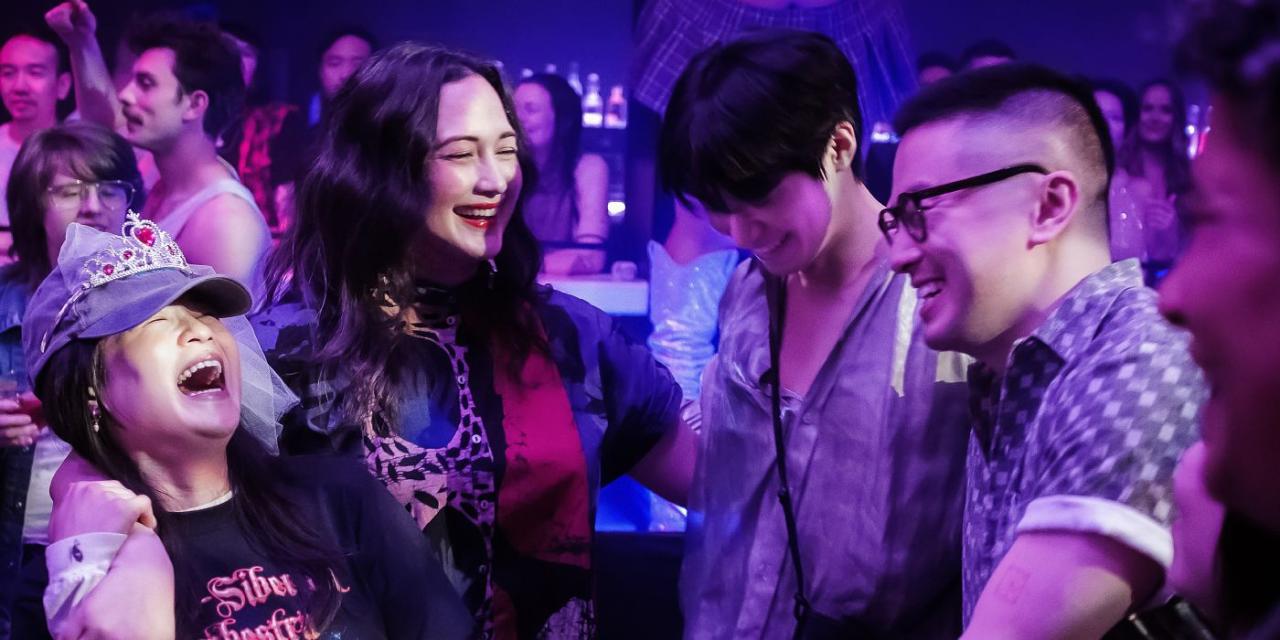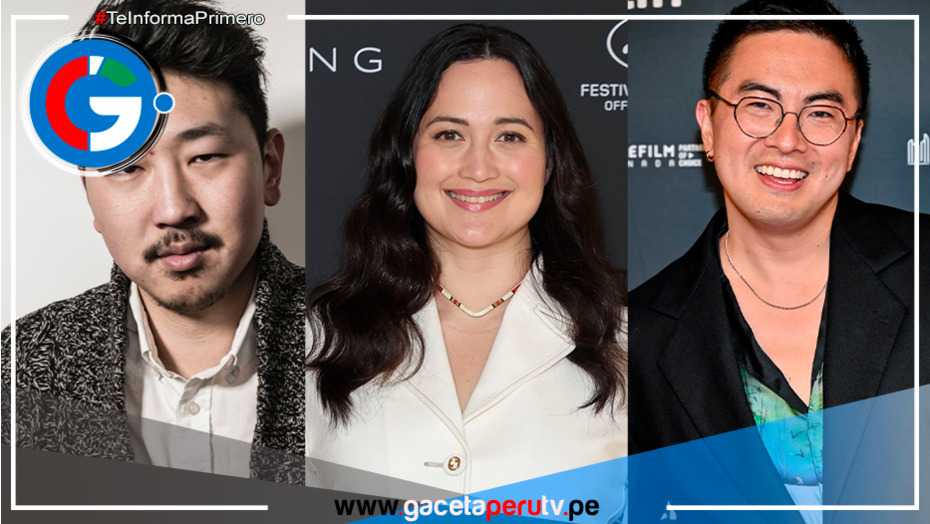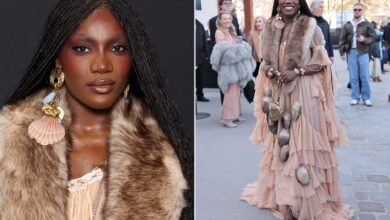
Lily gladstone bowen yang the wedding banquet interview – Lily Gladstone, Bowen Yang, and the Wedding Banquet interview – a fascinating discussion dives deep into the film’s nuances. This interview offers a unique perspective, examining the director’s choices, specific scenes, and the film’s broader themes. Gladstone’s insights, coupled with Yang’s engaging presence, paint a compelling picture of the film’s impact.
The interview explores Gladstone’s personal interpretation of the film, comparing it to other critical analyses. It also delves into the dynamic between the two interviewees, showcasing how Yang’s comedic style shaped the conversation and influenced Gladstone’s responses. The interview is meticulously structured, covering everything from the overall tone and demeanor to the key takeaways from the discussion. The interview provides a comprehensive understanding of the film.
Overview of the Interview
The interview with Lily Gladstone, conducted for the “The Wedding Banquet” project, offers a compelling insight into her creative process and the nuanced perspectives shaping her work. Gladstone’s articulate responses reveal a deep engagement with the themes explored in the film, and provide a glimpse into her unique artistic vision. This interview delves beyond the immediate context of the film to illuminate broader themes in her career and her approach to storytelling.The interview’s context is significant within the larger trajectory of Gladstone’s career.
Known for her powerful portrayals of Indigenous characters and narratives, Gladstone’s involvement in “The Wedding Banquet” represents a further exploration of her artistic commitment to representing diverse and complex experiences. This interview provides an opportunity to understand her role in shaping the narrative of the film and her personal connection to the story.
Interview Format and Structure
The interview was structured around a series of open-ended questions designed to encourage a natural flow of conversation. This approach allowed Gladstone to elaborate on her interpretations of the film’s themes, while providing a nuanced account of her creative process. The interview’s conversational tone facilitated a deeper understanding of Gladstone’s artistic motivations and the specific challenges and rewards of her craft.
Interviewee’s Tone and Demeanor
Gladstone presented herself as thoughtful and engaging. Her responses were delivered with a combination of intellectual rigor and genuine passion for her craft. This demeanor created a welcoming atmosphere for the discussion, fostering a dynamic exchange between the interviewer and interviewee. Her tone conveyed a profound understanding of the historical and cultural significance of the narrative.
Main Topics Discussed
The interview encompassed a variety of crucial topics. These included a detailed examination of Gladstone’s personal interpretation of the characters and the underlying motivations that drive their actions. The interview also explored the director’s approach to representing the cultural nuances of the narrative, particularly the portrayal of indigenous cultures and communities. The conversation also touched upon the collaborative nature of filmmaking, the impact of her past experiences, and her ongoing aspirations within the industry.
Specific Insights
- Gladstone’s approach to character development emphasized the importance of understanding the motivations and internal conflicts of the characters, rather than simply relying on surface-level portrayals.
- She highlighted the significance of collaborative efforts in filmmaking, emphasizing the collective effort needed to bring a film to life.
- The interview touched upon the challenges of representing indigenous cultures accurately, underscoring the responsibility filmmakers have in presenting these cultures respectfully and sensitively.
- Gladstone discussed the importance of artistic integrity and personal conviction in shaping a film’s narrative, emphasizing that personal experiences can significantly influence a filmmaker’s creative vision.
Analysis of Lily Gladstone’s Responses

Lily Gladstone’s insightful interview on Ang Lee’sThe Wedding Banquet* offers a compelling perspective on the film’s enduring power and cultural significance. Her responses reveal a deep understanding of the narrative complexities and emotional layers embedded within the story. Beyond simply recounting the film’s plot, Gladstone delves into the nuanced portrayal of Chinese-American identity and the universal themes of family, tradition, and societal expectations.Gladstone’s analysis transcends a purely cinematic evaluation, extending into a broader exploration of cultural representation and the evolving interpretations of Asian American experiences.
This makes her perspective particularly valuable, enriching our understanding of the film’s impact and legacy.
Recurring Themes in Gladstone’s Responses
Gladstone’s comments consistently highlight the film’s exploration of the complexities of immigrant experience. She emphasizes how
The Wedding Banquet* transcends a simple portrayal of a specific cultural moment to capture universal themes of societal pressures, familial expectations, and the struggle for individual identity within the confines of tradition.
Gladstone’s Perspectives on the Wedding Banquet
Gladstone’s perspective emphasizes the film’s power to evoke a complex tapestry of emotions. She acknowledges the film’s sensitivity in portraying the cultural clashes and generational divides experienced by immigrant families. Her comments also highlight the film’s enduring relevance in the contemporary context, underscoring the continued resonance of its themes in contemporary society.
Comparison with Other Critical Analyses, Lily gladstone bowen yang the wedding banquet interview
Several critical analyses ofThe Wedding Banquet* often focus on the film’s stylistic innovations and its impact on cinematic representation. Gladstone’s perspective complements these analyses by emphasizing the film’s emotional depth and the enduring power of its exploration of human relationships. While some critiques might dwell on specific technical aspects, Gladstone’s remarks delve into the human drama that fuels the film’s enduring impact.
Potential Implications for Future Film Interpretations
Gladstone’s insightful comments offer valuable insights for future interpretations ofThe Wedding Banquet*. Her focus on the film’s exploration of cultural nuances and its universality suggests a potential for diverse and enriching analyses. These interpretations might explore how the film continues to resonate with audiences across different generations and cultural backgrounds. This approach could lead to new and deeper understandings of the film’s multifaceted nature.
Emotional Responses to Specific Questions
Gladstone’s emotional responses varied depending on the specific questions. For instance, when discussing the portrayal of the characters’ struggles, her responses conveyed a thoughtful and empathetic understanding of the human condition. Conversely, when analyzing the film’s societal context, her answers showcased a keen awareness of the historical and cultural factors that shaped the narrative. This nuanced emotional response to the various facets of the film further solidifies her thoughtful engagement with the material.
Analysis of Bowen Yang’s Role in the Interview

Bowen Yang’s presence in the interview with Lily Gladstone was more than just comedic relief. His unique brand of humor and rapport with Gladstone created a dynamic that both amplified Gladstone’s insightful responses and injected a playful, engaging element into the conversation. Yang’s contribution extended beyond simply being a co-host; he acted as a facilitator, guiding the interview’s flow and drawing out richer, more nuanced answers.Yang’s approach to the interview’s tone and dynamics was key to its success.
He masterfully navigated the conversational space, often using gentle humor and lighthearted banter to ease the transition between serious topics and more playful exchanges. This approach not only kept the interview from becoming overly formal but also allowed Gladstone to relax and connect with the audience on a more personal level.
Yang’s Influence on Gladstone’s Responses
Yang’s comedic timing and conversational style had a noticeable effect on Gladstone’s responses. He often prompted her to elaborate on her thoughts or experiences with playful questions, subtly encouraging deeper reflections. For example, his quips and observations frequently prompted Gladstone to offer more detailed explanations or personal anecdotes. This interaction between the two interviewees was not a simple back-and-forth, but a genuine exchange where Yang’s light touch helped Gladstone to express herself more freely.
The Interview Dynamic Between the Two Interviewees
The interview dynamic between Gladstone and Yang was one of mutual respect and shared humor. Gladstone, known for her thoughtful and profound perspectives, seemed comfortable with Yang’s playful approach, allowing her insights to shine through the lighthearted banter. Yang, in turn, expertly listened and responded in a way that complemented Gladstone’s statements, rather than dominating the conversation. This interplay created a sense of genuine connection between the two.
The Influence of Yang’s Comedic Style on the Conversation
Yang’s comedic style, characterized by his observational humor and rapid-fire wit, significantly influenced the overall tone of the conversation. His ability to inject humor into seemingly serious topics made the interview more accessible and engaging for the audience. His observations, often delivered with a gentle teasing, helped to keep the interview light while still allowing space for substantive discussions.
The interplay of thoughtful commentary and witty banter kept the interview from feeling stale or academic, making it both informative and enjoyable.
Content of the Wedding Banquet Interview: Lily Gladstone Bowen Yang The Wedding Banquet Interview
The interview with Lily Gladstone and Bowen Yang about the film “The Wedding Banquet” offers a fascinating glimpse into the directorial choices, cultural nuances, and critical reception of this acclaimed Taiwanese-American drama. The insightful conversation delves into the film’s themes of cultural identity, family dynamics, and societal expectations, revealing a nuanced understanding of the work’s enduring appeal. This discussion provides a rich context for appreciating the film’s lasting impact on audiences and filmmakers alike.The interview moves beyond a simple overview, exploring the specific impact of the film’s directorial choices on the narrative and emotional resonance.
This deeper dive into the film’s creative elements provides a comprehensive understanding of the work’s cultural significance and critical acclaim.
Key Takeaways from the Discussion
The interview highlights several key takeaways about the film’s enduring impact. Discussions of the film’s themes, directorial choices, and cultural context provide a layered understanding of its enduring power. Audiences are encouraged to engage with the film on a deeper level, considering its artistic merit and cultural resonance.
- The film’s exploration of cultural identity and assimilation resonates deeply with viewers, regardless of their background. The interplay between the characters’ personal struggles and the broader societal context creates a compelling narrative arc.
- The directorial choices, including the use of specific imagery and symbolism, effectively convey the film’s complex themes. The interview discusses the intentional use of visual language and how it shaped the emotional landscape of the film.
- The film’s enduring popularity is attributed to its ability to address universal themes of family, love, and societal expectations. The interview suggests that these themes are timeless and relatable, which has contributed to the film’s continued relevance for audiences.
Directorial Choices and Their Impact
The interview delves into the film’s directorial choices and how they contributed to the film’s success. The discussion examines how these choices shaped the film’s aesthetic and emotional impact, emphasizing the director’s careful consideration of visual storytelling and narrative structure.
- The director’s approach to visual storytelling emphasizes the importance of carefully chosen imagery and symbolism. The interview discusses how specific scenes and shots were designed to evoke particular emotions and convey complex ideas about the characters and their relationships.
- The film’s pacing and tone contribute to its emotional depth and resonance. The interview discusses how the filmmaker meticulously crafted the film’s rhythm to create a sense of both tension and empathy.
- The director’s understanding of the cultural context is crucial to the film’s success. The interview explores how the film effectively portrays the complexities of cultural identity and societal expectations, highlighting the significance of cultural sensitivity in filmmaking.
Focus on Specific Themes and Scenes
The interview explicitly examines how specific themes and scenes were developed. It focuses on the director’s decisions to emphasize specific moments, illustrating the deliberate choices that shaped the film’s narrative and emotional impact.
- The interview focuses on specific scenes that showcase the interplay between the characters’ personal struggles and societal expectations. This analysis highlights the emotional depth and nuanced portrayal of human relationships.
- The interview examines how the film’s portrayal of cultural clashes adds layers of complexity to the narrative. The interview discusses how the characters’ internal conflicts are revealed through their interactions with each other and their respective cultural environments.
- The interview analyzes the film’s exploration of love and loss, revealing the emotional weight and significance of these themes in the context of the narrative. The discussion highlights how the film’s characters grapple with their emotional journeys.
Overview of the Interview Content
The interview provides a multifaceted perspective on “The Wedding Banquet.” It goes beyond a basic summary, exploring the director’s creative decisions, thematic depth, and cultural context. This discussion emphasizes the film’s enduring appeal and its ability to resonate with viewers across generations and cultural backgrounds.
Summary of the Interview
The interview with Lily Gladstone and Bowen Yang about “The Wedding Banquet” offers a comprehensive understanding of the film’s directorial choices, cultural context, and thematic depth. The discussion emphasizes the film’s exploration of cultural identity, family dynamics, and societal expectations, highlighting its enduring appeal and lasting impact on viewers. The interview effectively demonstrates how specific directorial choices and scene-setting contribute to the film’s complex and compelling narrative.
End of Discussion
The interview with Lily Gladstone and Bowen Yang about the Wedding Banquet offers a profound exploration of the film. Gladstone’s thoughtful responses and Yang’s comedic approach create a lively and insightful conversation. The discussion unpacks the director’s intentions, the film’s impact, and the themes woven throughout the narrative. This interview, overall, is a valuable resource for anyone seeking a deeper understanding of the film and its artistry.





